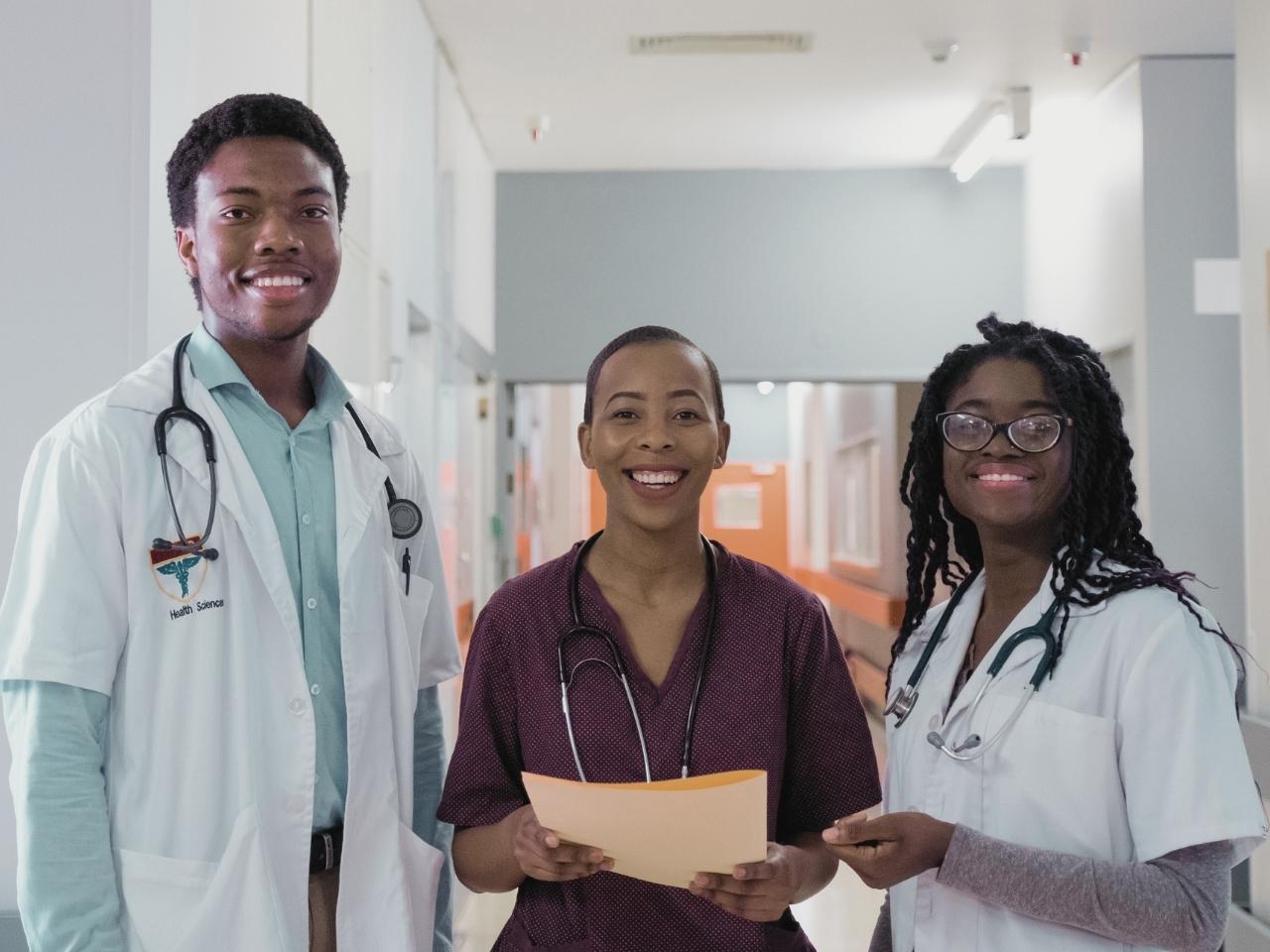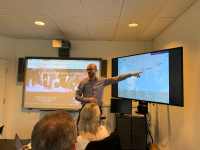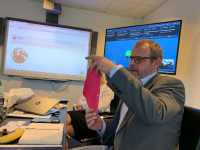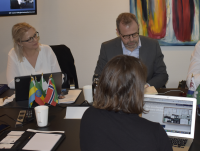We gather Nordic Life Science companies with a focus on business in Africa
The aims of the cluster
- Identifying business opportunities and barriers.
- Discussing challenges and possible solutions.
- Knowledge sharing and exchange among members.
- Meeting & learning from health & healthcare experts.
- Forging new collaborations between suppliers.
- Organising targeted healthcare delegations to Africa.

Practicalities
Target group & eligibility
- The target group is all Nordic companies involved in the life science sector, who do or wish to do business in Africa.
- Our Nordic Life Science Business Cluster is open to Nordic companies.
Cluster meetings
- Meetings take place quarterly in the Nordics.
- Meetings usually take place in- or around the capital city.
- Most often, members can join meetings either physically or remotely.
Membership & fees
Members of AFRICA INNOVATION NETWORK ® may join the cluster free of charge.
The annual fee for non-members of AFRICA INNOVATION NETWORK ® is:
- EUR 1500 (ex. VAT) for large companies (250+ employees)
- EUR 1000 (ex VAT) for medium companies (50-250 employees)
- EUR 500 for small companies (up to 50 employees)
This fee covers attendance of up to 3 company representatives per meeting.
- Identifying business opportunities and barriers.
- Discussing challenges and possible solutions.
- Knowledge sharing and exchange among members.
- Meeting & learning from health & healthcare experts.
- Forging new collaborations between suppliers.
- Organising targeted healthcare delegations to Africa.
The practicalities
Target group & eligibility
- The target group is all Nordic companies involved in the life science sector, who do or wish to do business in Africa.
- Our Nordic Life Science Business Cluster is open to Nordic companies.
Cluster meetings
- Meetings take place quarterly in the Nordics.
- Meetings usually take place in- or around the capital city.
- Most often, members can join meetings either physically or remotely.
Membership & fees
Members of AFRICA INNOVATION NETWORK ® may join the cluster free of charge.
The annual fee for non-members of AFRICA INNOVATION NETWORK ® is:
- EUR 1500 (ex. VAT) for large companies (250+ employees)
- EUR 1000 (ex VAT) for medium companies (50-250 employees)
- EUR 500 for small companies (up to 50 employees)
This fee covers attendance of up to 3 company representatives per meeting.
How to join the cluster
Please do not hesitate to reach out if you would like to join our Nordic Healthcare Business Cluster. You can contact CEO at Nordic-African Consultancy, (Mr.) Flemming Sørensen at: fls@nordic-african.com.
If you are interested in joining a local Nordic Healthcare Business Cluster in your country, feel free to contact us and present your idea/wish. We are always looking to set up additional Nordic Business Clusters for peers to meet and exchange about their business interests in Africa.
Cluster meetings and our other Healthcare-related events
2023
Upcoming
November 30th, 1 pm–4 pm: Cluster meeting at Nordic-African Consultancy, Copenhagen.
Agenda
Megatrends & Digital/M-health/Medtech solutions
The use of mobile and other digital technologies represents a huge opportunity for strengthening access to health care and the delivery of health care across Africa. Mobile phone ownership and usage is widespread among all age groups in the country, and internet penetration is increasing. Reaching out to people through their phones can therefore play an important role in raising awareness and promoting more health-focused behaviour. At the same time, through better use of technology in health facility settings, gaps and bottle-necks in the service delivery can be identified in real time and rapidly addressed.
At this Nordic Healthcare Business Cluster meeting we will discuss the various business opportunities in Africa. We welcome our members and any Nordic company with focus on solutions to the healthcare industry.
Sign up
Address and agenda will be submitted to all participants prior to the meeting. Sign up: CEO, Mr. Flemming Soerensen: fls@nordic-african.com
Previous
2022
- December 6th, 1 pm-4 pm: Cluster meeting at WS Audiology, Copenhagen.
- September 13th, 1 pm-4 pm: Cluster meeting at WS Audiology: “Making hearing diagnosis and care accessible to all“, Copenhagen.
- April 5th, 1 pm-4 pm: Cluster meeting at Roche Diagnostics: “Sustainability in healthcare development in Africa“, Copenhagen.
- Postponed due to COVID-19: Cluster meeting: “Norwegian healthcare companies in Africa“, Oslo, Norway.
2021
- November 29th, 1 pm – 4 pm (postponed due to COVID-19): Cluster meeting at Roche Diagnostics, “Sustainability in healthcare development in Africa”, Copenhagen.
- March 3rd, 1 pm-4 pm: Cluster meeting at AFRICA INNOVATION NETWORK®, “Public and private actors in selected African countries” Copenhagen.
- January 23rd, 1 pm-4 pm : Cluster meeting, “The health-tech sector in Africa”, Copenhagen.
Facts and figures
Communicable and non-communicable diseases in Africa
Significant progress has been made in the eradication of communicable and non-communicable diseases in Africa.
- The African continent was certified free of indigenous wild polio in 2020.
- Algeria was the third African country to be officially certified as free of malaria in 2019, after Mauritius (1973) and Morocco (2019).
- Botswana, Cabo Verde, Comoros, Eswatini and South Africa are on track to malaria elimination.
- 42 countries have been certified free of Guinea worm disease, with only Angola, Chad, Ethiopia, Mali and South Sudan remaining.
- By March 2022, 30 African countries had been validated as achieving maternal and neonatal tetanus (MTN) elimination.
- By 2021, in the African Region, 88% of people living with HIV knew their status. Among people who knew their status, 89% were accessing treatment, and among people accessing treatment, 92% were virally suppressed.
- Declines in numbers of new HIV infections are greatest in sub-Saharan Africa; a 57% reduction in Eastern and Southern Africa, and a 49% reduction in Western and Central Africa.
Yet challenges remain:
- Disruptions of medical supply chains and unstable availability of medicine or equipment, insufficient last-mile health service delivery, lack of proper data collection, storage, and analysis, inadequate financing, unavailability of healthcare professionals, uneven or unequal access, low user penetration or community adoption and policy ineffectiveness are important hurdles to overcome in the healthcare sectors.
- 1) Nigeria, 2) Democratic Republic of the Congo, 3) Mozambique, 4) United Republic of Tanzania, 5) Angola, 6) Ethiopia, 7) Uganda, 8) Côte d’Ivoire, 9) Cameroon and 10) Madagascar are the top ten countries facing the highest disease burden in Africa, including malaria, HIV, and tuberculosis. Two of these countries, Nigeria and Ethiopia, make up 15.3% and 8.6% of the African population.
- Angola, Central African Republic, Guinea, Mali, Nigeria, Somalia, Sudan, and South Sudan) are yet to eliminate maternal and neonatal tetanus (MNT).
- Tuberculosis continues to be a significant public health problem. In 2021, the African region accounted for 24% of global cases and 32% of deaths. Based on the TB incidence rate, 18 countries in the African Region were among the 30 high TB urden countries in the world.
- Two thirds of the 25.6 million [23.4-28.6 million] people living with HIV ((PLHIV) globally live in the African region, with the majority in East and Southern Africa [16.3 million].
- Neglected tropical diseases (NTDs) are also responsible for a high burden of disease in the region. Of the 20 NTD groups globally, 19 of these (the exception is Chagas disease) are present in Africa.
- Vaccine preventable diseases remain a challenge in the region. WHO and UNICEF estimate that 7.6 million children in the African region missed out on vaccination in 2021 and a further 11 million children were under-immunized, making up over 40% of the under-immunized and missed children globally.
- In 2021, there were 207,167 suspected meningitis cases across the Africa meningitis belt.
- A total of 88,789 cases of measles were reported in at least 35 countries in 2021.
- Approximately 8.9 million cases of SARS-COV-2 (COVID-19) had been reported by December 2022, representing approximately 1.3% of the global COVID-19 cases. A total of 173,988 COVID-19-related deaths were recorded in the region with an estimated case fatality ratio of 2%. COVID-19 continues to have a wide impact on health service care delivery.
Non-communicable diseases is becoming an increasing burden.
- The African region experiences an increasingly high burden of non-communicable diseases (NCDs), mainly cardiovascular diseases (heart disease and stroke), cancer, diabetes, chronic respiratory diseases, and poor mental health.
- Currently, the proportion of mortality due to NCDs ranges from 36% to 88%. Cardiovascular diseases, cancers, diabetes mellitus and chronic respiratory diseases account for over 70% of NCD-related mortality.
These facts and figures are retrieved from the WHO reports Communicable and non-communicable diseases in Africa in 2021/22 and Country Disease Outlook August 2023 for the African region.
Health expenditure in Africa
Low income countries in Africa rely heavily on external aid and private spending to finance health spending.
- In Sub-Saharan Africa, external health expenditure accounts for more than 13% of current health expenditure..
- Out-of-pocket health expenditure accounts for more than 30%.
Health expenditure differs across country income categories (2020 numbers)
- Low income countries spend approximately 6% of GDP on health.
- Lower-middle income countries spend approximately 5% of GDP.
- Upper-middle income countries spend approximately 7% of GDP.
- High income countries spend approximately 9% of GDP.
The Sub-Saharan average is around 5% of GDP. In PPP, the Sub-Saharan average for health expenditure per capita is approximately $190 – up from approximately $100 in 2000.
Preventive and ambulatory care are the main priorities in primary health care
- In low income countries, most government and donor spending on primary health care is spent on preventive care.
- In lower-middle income countries, a third of government and donor spending on primary health care is spent on preventive care, while another third is spent on outpatient care.
Data is retrieved from the WHO Global Health Expenditure database and the WHO report Global spending on health: Rising to the pandemic’s challenges.
Sustainable business opportunities
There are numerous sustainable business opportunities in Africa for Nordic companies in the healthcare sectors. At all income levels, African countries face changing demographics, changing disease burdens as well as simultaneous health advances and health-related challenges.
Danish healthcare-related and relevant competences within e.g. pharma and digitalisation could make a significant difference in tackling current healthcare developments in Africa and in reaching the many Sustainable Development Goals related to good public health and wellbeing.
Digital Health
The general Digital Health market encompasses a broad scope of technologies targeting multiple consumer groups. Within this broader trend, MedTech and eHealth are promising market segments of increasing importance, spanning innovative products and solutions from online pharmacies and consultations to eHealth devices and, slowly but steadily, eHealth apps.
Internet and smartphone use along with tendencies towards growing consciousness of health and wellbeing have sparked significant growth in the Digital Health market. Further, the COVID-19 pandemic has spurred investment and innovation in the sector, accelerating market development, with its ensuing needs for remotely accessible health, healthcare or therapeutic services, self-monitoring options and assistance with personal management of health conditions. Considering just B2C segments, the Digital Health market is expected to grow significantly in the years ahead, and growth rates, market volumes and revenues paint a picture of a sector of the future.
Revenue growth in African markets for digital health is mainly driven by generalised health, fitness and wellbeing apps with greater revenues per user.
- Revenue in the Digital Health market is projected to reach $5,870,000,000 in 2023. The market’s largest segment will be Digital Fitness & Well-Being with a total revenue value of $3,620,000,000 in 2023.
- Revenue is expected to show an annual growth rate (2023-2027) of 15.43%, resulting in a projected market volume of $10,420,000,000 by 2027.
- The average revenue per user (ARPU) is expected to amount to $23.31.
However, healthcare digitalisation is advancing as well, and the majority of digital health users stem from eHealth solutions.
- Revenue in the eHealth segment is projected to reach $2,257,000,000 in 2023.
- Revenue is expected to show an annual growth rate (2023-2027) of 17.72%, resulting in a projected market volume of $4,334,000,000 by 2027.
- User penetration is 13.66% in 2023, expected to hit 18.70% by 2027.
- Average revenue per user (ARPU) is expected to amount to $13.15.
Specialised Medication Checker and Contraception & Fertility apps are on the rise.
- Revenue in the eHealth apps segment is projected to reach $90,190,000 in 2023.
- Revenue is expected to show an annual growth rate (2023-2027) of 18.31%, resulting in a projected market volume of $176,700,000 by 2027.
- User penetration is 1.15% in 2023, expected to hit 1.40% by 2027.
- The average revenue per user (ARPU) is expected to amount to $6.24.
The supply side of the African Digital Health market is maturing as well and fostering ever more suitable potential local business partners and pools of innovation. In the last decade, a vibrant African business ecosystem has emerged, and the field has increasingly attracted entrepreneurs and investors alike:
- In 2022, 53 African eHealth startups secured investor funding.
- By now, eHealth accounts for 8.4% of funded startups in Africa – ranking #4 as most funded start-up sector on the continent.
Facts and figures on Digital Health and eHealth are retrieved from Statista.
2023
Roundtable meetings and Healthcare business delegations
NEXT MEETING: August 31st from 1 – 4 pm: Cluster meeting at: AFRICA INNOVATION NETWORK
Agenda
Megatrends & Digital/M-health/Medtech solutions
The use of mobile and other digital technologies represents a huge opportunity for strengthening access to health care and the delivery of health care across Africa. Mobile phone ownership and usage is widespread among all age groups in the country, and internet penetration is increasing. Reaching out to people through their phones can therefore play an important role in raising awareness and promoting more health-focused behaviour. At the same time, through better use of technology in health facility settings, gaps and bottle-necks in the service delivery can be identified in real time and rapidly addressed.
At this Nordic Healthcare Business Cluster meeting we will discuss the various business opportunities in Africa. We welcome our members and any Nordic company with focus on solutions to the healthcare industry.
Sign up
Address and agenda will be submitted to all participants prior to the meeting. Sign up: CEO, Mr. Flemming Soerensen: fls@nordic-african.com
____________________________________________________________________________________________________________________________________________________
- October 5th from 1 – 4 pm: Cluster meeting at: TBA
- November 30th from 1 – 4 pm: Cluster meeting at: TBA
Meetings in 2022
- Copenhagen, Denmark, December 6th – Healthcare Business Cluster meeting at WS Audiology in Northern Copenhagen.
- Copenhagen, Denmark, April 5th (subject to change due to Covid-19), Healthcare Cluster Roundtable Meeting at Roche Diagnostics: “Sustainability in healthcare development in Africa“.
- Copenhagen, Denmark, September 13th, 2022, Healthcare Cluster Roundtable Meeting at WSAudiology: “Making hearing diagnosis and care accessible to all“.
- Oslo, Norway, (TBC) 2022, Healthcare Cluster Roundtable Meeting: “Norwegian healthcare companies in Africa“.
Meetings in 2021
November 29th, 2021 (postponed due to Covid-19)
Healthcare Cluster Roundtable Meeting at Roche Diagnostics: “Sustainability in healthcare development in Africa“.
March 3rd, 2021
Healthcare Cluster Roundtable Meeting: “Public and Private actors in selected African countries”.
– Facts and figures about the healthcare sector in Africa. Which are the major players in the African healthcare industry.
– An overview of the public and private healthcare sector in selected African countries.
January 23th, 2021
Healthcare Cluster Roundtable Meeting: “The health-tech sector in Africa”.
– An overview of how fast digitalisation of the healthcare sector in Africa is taking place.
“The adoption of digital technology in developing countries, including Africa, brings about short and long-term benefits in public health and beyond. Through digital tools and capacity building, countries can improve the effectiveness, efficiency, and quality of their health facilities and health system performance.”
United Nations, Office of the Special Advisor on Africa, 2023
Statements from the members

“It was great to meet such highly inspiring people and already at this first meeting we discussed concrete new business opportunities”
Mr. Bo Birk, Director, Int. Sales, Missionpharma

“The cluster is all about exploring and exploiting synergies in terms of products, distribution channels, experiences and connections”
Mr. Torben Holm Larsen, Technical Director, Real Relief

“Highly valuable sharing experience how other companies operate in Africa”
Mr. Søren Poulin, Vice President, Ambu

“It’s amazing to join forces with such a dynamic and like-minded business cluster on a common mission”
Mrs. Heidi Jacobsen, International Sales, Abena
